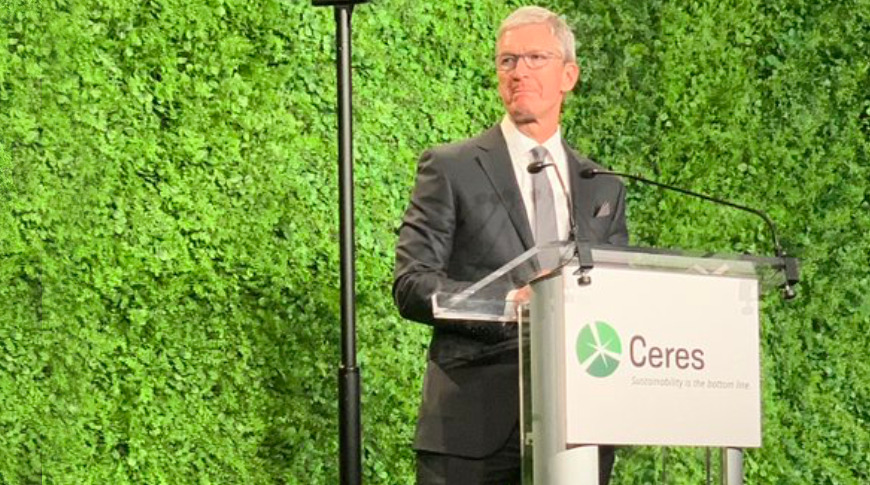Apple CEO Tim Cook told a New York City audience that Apple sees climate change as an opportunity to "develop new and valuable competencies."
Tim Cook presented the keynote speech at last night's 30th anniversary gala for Ceres, a nonprofit company which aims to promote sustainable energy for the environment and the economy.
Cook and Apple were being honored by the organization and Cook used his speech to describe how Apple views sustainability.
"We don't see climate change as risk, but opportunity," he said. "With our supply chain partners, we see a chance to develop new and valuable competencies... because it is the right thing to do."
After the event, Cook tweeted his thanks for Ceres and called on all firms to do what they can.
"Companies have a responsibility to use their innovation and agility to lead on the climate crisis," he wrote. "Thank you to Ceres for their work and for this award — and to Lisa Jackson and the team for driving us all forward."
Companies have a responsibility to use their innovation and agility to lead on the climate crisis. Thank you to Ceres for their work and for this award — and to @LisaPJackson and the team for driving us all forward.
— Tim Cook (@tim_cook) October 22, 2019
Lisa Jackson is Apple's vice president of environmental, social and policy initiatives, working on the company's pursuit of responsible manufacturing and operations.
Cook reportedly also described how Jackson and others have implemented plans to achieve 100 percent renewable energy.
 William Gallagher
William Gallagher









 Chip Loder
Chip Loder
 Wesley Hilliard
Wesley Hilliard
 Amber Neely
Amber Neely
 Marko Zivkovic
Marko Zivkovic
 Malcolm Owen
Malcolm Owen
 Andrew O'Hara
Andrew O'Hara
 Christine McKee
Christine McKee








22 Comments
Good on him. I'd rather that a company that believes in this leads rather than a government that forces people to do things under imprisonment or financial ruin.
I know there are those that say that this is an immanent threat with dire consequences to be experienced in the next 7-30 years, as it has for the last 100 years, but it's nice to see Apple putting its money where its mouth is, rather than putting my money where their mouth is.
Global carbon emissions are still rising every year, so corporate agility and innovation is only part of the solution. If you treat corporations like they're the leaders, you're not going to change quickly enough.